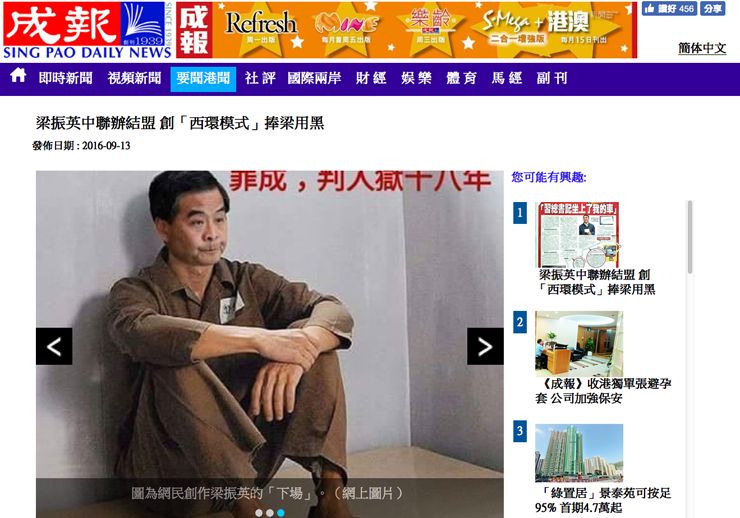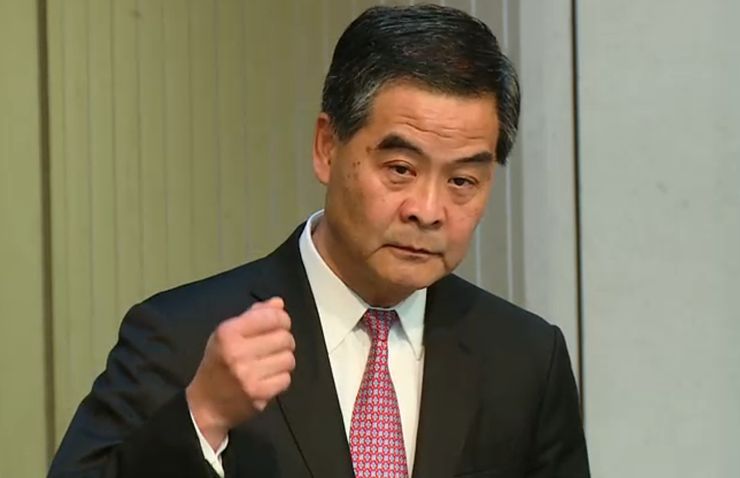The Chief Executive Leung Chun-ying has dismissed criticism from a pro-Beijing newspaper on Tuesday, which claimed that he has been inciting the Hong Kong independence movement, and was supported by the China Liaison Office with the help of triad members.
The Sing Pao newspaper has been carrying front page editorials slamming the alleged collusion between Leung and the Liaison Office – China’s official organ in Hong Kong – for two weeks. It started by demanding the Chinese disciplinary agency stationed in Hong Kong investigate them.
Leung was asked about the Sing Pao editorial on Tuesday, before a regular Executive Council meeting. He told reporters in response: “It was not worth commenting on – you know what was going on very well.”

On Monday, the newspaper claimed that Leung was part of a “Gang of four in messing up Hong Kong.”
The two other members mentioned include Zhang Xiaoming, director of the China Liaison Office, and Jiang Zaizhong, director of the Hong Kong Ta Kung Wen Wei Media Group – the group behind two major pro-Beijing newspapers Ta Kung Pao and Wen Wei Po.
Sing Pao did not name the fourth person. It claimed the three were followers of now-jailed former Communist Party chief in Chongqing Bo Xilai, that they built a “safe harbour” in Hong Kong, in an attempt to cause trouble in the city and consolidate their power.
It said that Ta Kung Pao often carried reports praising Bo’s rule in Chongqing – but Jiang managed to stay in power after Bo was disgraced. The newspaper urged the Chinese disciplinary agency to investigate him.

Sing Pao’s Tuesday editorial then claimed Leung was part of a “Sai Wan model” – the China Liaison Office is located in Sai Wan – as he was supported by the office with help of triads.
“They forced or bribed the pro-Beijing camp to follow the Liaison Office’s orders,” it read. “And through fabricated news by Jiang Zaizhong… they told lies to all levels – it was getting crazier and crazier, and Hong Kong was boiling with resentment.”
‘Fake’ news
The fabricated news, according to the newspaper, related to a report on Ta Kung Pao in 2013 about a taxi ride supposedly taken by Chinese president Xi Jinping, and a report claiming that new Hong Kong medical sector lawmaker Pierre Chan Pui-yin was part of the pro-Beijing camp.
Chan had denied the claim, saying he opposed Leung Chun-ying being re-elected as well as the restrictive political reform package proposed by the government.
The editorial claimed the Hong Kong political circle “laughed” at the inclusion of Chan in the pro-Beijing camp, that it was a “victory” shown to Beijing with “spirit of Don Quixote”.

Meanwhile, Leung also told reporters that he hoped newly-elected lawmakers would not wage filibusters in the Legislative Council.
He made the statement after international ratings corp Moody’s warned that new filibustering lawmakers could damage Hong Kong’s credit rating.
“No matter whether it was reasonable for Moody’s to lower Hong Kong’s credit rating because of filibusters, it showed that filibusters have caused a negative impact internationally,” Leung said.
Editor’s note: Digital media outlets such as Hong Kong Free Press are currently barred from attending government press conferences.
